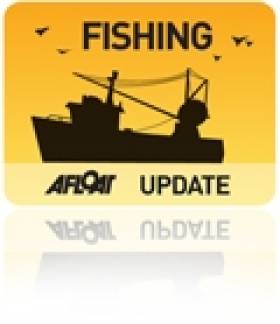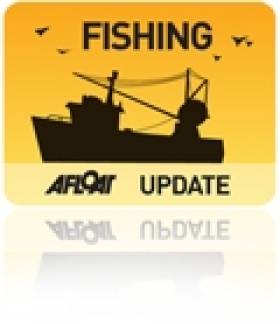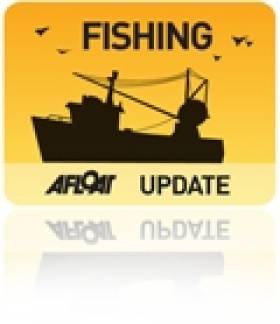Displaying items by tag: SFPA
Sea-Fisheries Protection Authority Meet with Newly Appointed Sea-Fisheries Protection Consultative Committee
#sfpa – The Sea-Fisheries Protection Authority (SFPA) will meet with the newly appointed Sea-Fisheries Protection Consultative Committee, today, Thursday 7th March at Agriculture House, Dublin. The 14 member Consultative Committee which consists of representatives from the Irish marine community, is appointed by the Minister for Agriculture, Food and Marine, under the provisions of the Sea Fisheries and Maritime Jurisdiction Act to liaise with SFPA on behalf of the sea-fisheries and seafood sectors. The previous Consultative Committee were particularly active in their regular meetings with the SFPA which is now reinvigorated following recent new appointments by the Minister for Agriculture, Food and the Marine, Mr Simon Coveney, TD, including a new Chairperson, Ms Gillian Mills. Today's meeting marks the first sitting of the new Consultative Committee.
Engagement between the SFPA and the Consultative Committee is a two-way process - the Consultative Committee's primary function as described in legislation is to inform the SFPA of the concerns and views of the sea-fisheries and seafood sectors regarding the functions of the SFPA and equally to facilitate the SFPA with communicating to the wider industry.
Part of the remit of the Committee is to also advise the SFPA on the fairness and consistency of its operations. The Consultative Committee will also keep the sea-fisheries and seafood sectors generally informed of the applicable sea-fisheries law and food safety law, as well as of the standards, guidelines, practices and procedures operated by the SFPA in relation to the enforcement of that law. Overall the Consultative Committee's function is to seek the delivery of a high standard of service by the SFPA.
Micheál O'Mahony, Board member with the SFPA said: "The SFPA can only achieve its goals through open dialogue with the sea-fisheries and seafood sectors. This Sea-Fisheries Protection Consultative Committee is a valuable forum through which we continue to share key information on how best to monitor the sea-fisheries and seafood sectors. We are delighted to see the reinvigoration of the role of the committee by the Minister, as various significant challenges are faced in the implementation of current and incoming legal obligations in these sectors.
I am sure this collaboration between the SFPA and the Consultative Committee will continue to help SFPA to work towards its service delivery and facilitate ongoing industry compliance. The SFPA and the industry share common goals, most notably the attainment of a vibrant, compliant seafood sector. We look forward to a fruitful exchange of information and ideas on how we can best work together to protect the interests of legitimate operators within the sea-fisheries and seafood sectors. I would also like to take this opportunity to thank Mr Tom Geoghegan for successfully taking on the role of acting Chair of the Consultative Committee - Mr Geoghegan remains on as Deputy Chair of the Consultative Committee."
This year Ireland will provide the Naval Vessel LE Aoife which will act as a platform for inspectors from Ireland, United Kingdom, France and Spain to engage in fisheries control. This patrol will take place in May and will operate in the European Economic Zone's of Ireland, United Kingdom, France and Spain.
Historically the control of trans-boundary fishing was a problem as fishing vessels could cross from one jurisdiction to another to avoid inspection. The problem was initially very prevalent in the North Sea and the first proposals for trans-boundary co-operation within the EU were developed there.
The European Commission has formalised the protocols through the introduction of legislation. Ireland, United Kingdom, France and Spain have worked very closely on this protocol. Ireland has shared boundaries for fisheries control with these other Member States.
Peter Whelan, Chairman of the SFPA said: "The SFPA's authorisation of this latest fisheries patrol is aligned with our goal of promoting a level playing field across EU waters. I welcome this initiative which I believe will benefit all fishermen who operate in compliance with the law. As fisheries are a common resource it is vital that all operators from all EU fleets respect the rules. We must rebuild our fish stocks by implementing conservation measures and tackling illegal fishing by fleets in our waters which is a major cause of the decline in our fish stocks and quotas. This initiative will provide an opportunity to stop the cycle of decline which in turn will support the development of a sustainable profitable future for our industry. We will continue to work with the Competent Authorities of other Member States to promote a uniform standard of fisheries control."
European Commission Penalise Spanish for Over-fishing
In a move to protect dwindling fish stocks, the European Commission recently took decisive action by significantly reducing Spain's mackerel quotas over the next few years as a result of over-fishing. This over-fishing of mackerel by the Spanish has been of major concern to the Irish fishing industry and was brought to the attention of the Commission by the Sea-Fisheries Protection Authority (SFPA) and other bodies.
Spanish fishermen landed almost twice as much mackerel in 2010 from the Cantabrian Sea, in the southern part of the Bay of Biscay, as they were permitted. Through their investigations, the European Commission discovered that the mackerel catch exceeded Spain's quota in the year 2010 by 19,621 tonnes. The European Commission has now passed a regulation reducing Spain's future quotas to account for the excess catches. Spain is obliged, in the period between 2011 and 2015, to return twice the amount of mackerel wrongfully caught.
In order to help combat over-fishing the SFPA operates a round the clock monitoring and surveillance programme to ensure the effective control of fish catches and landings. To promote a culture of compliance with National and EU legislation, landings by Irish, EU and Third Country vessels are inspected by the SFPA in Irish ports. Sea-Fisheries Protection Officers engage in a range of at-sea inspection programmes including both inshore and offshore patrols in conjunction with the Naval Service and Joint inspection patrols with other Member States operating in Irish waters and in those of other Member States.
The SFPA will work with Member States and with the Community Fisheries Control Agency (CFCA) based in Vigo, Spain, when a specific control and inspection programme for pelagic fisheries in Western Waters of the North East Atlantic is established - this is expected to be adopted in the near future. This will allow for the co-ordination of joint control, inspection and surveillance activities by Member States for these pelagic fisheries.
Peter Whelan, Chairman of the SFPA said: "The recent decision by the EU to impose sanctions on Spain for over-fishing and to protect the valuable mackerel fishery is significant. There is a need for all Member States to work together and to comply with the Common Fisheries Policy's rules in order to ensure the sustainable development of fisheries. The role of the SFPA supports profitable, sustainable, managed fisheries at a time when the fishing industry faces many challenges. Effective monitoring and control systems safe-guards the good reputation of Irish food producers in the international marketplace and protects Irish taxpayer from the threat of large fines being imposed when non-compliances with the Common Fisheries Policy are encountered. The SFPA will continue with our aim of working with other Member States to promote a uniform standard of monitoring, control and surveillance."
Sea-Fisheries Protection Authority Announce Partnership with National Learning Network
National Learning Network is the training and employment division of the Rehab Group and many of those participating in the programme would have previously found it difficult to access employment due to accident, illness or disability.The partnership programme, which is already in operation in a number of SFPA offices throughout the country, has enabled National Learning Network students to gain valuable work experience and to avail of a wide range of external training opportunities with the SFPA.
Welcoming the official launch of the partnership, Marie Kelly, Director of Training and Employment Services, Rehab Group, says: "At a time when the economy is in recession, it's very exciting that an organisation such as the SFPA places such an importance on providing opportunities for people who may otherwise find it difficult to secure experience in the workplace.
National Learning Network provides ongoing support to all our students on employer-based training programmes. However, what sets the SFPA apart from many other employers is its commitment to providing structured training in a supportive working environment. Staff members within the organisation take time to mentor the students and to assess their needs, providing training opportunities for the students in areas where their skills could be further developed.
"The partnership between SFPA and National Learning Network is a wonderful model for the provision of training opportunities and work placements for those at a disadvantage in the labour market. It is our hope that other organisations, particularly state-sponsored bodies, will see the success of this partnership and introduce similar work placement programmes."
Sandra Ní Artaigh, Human Resources Director at the SFPA stated that: "From a Human Resources perspective, we have been presented with a wonderful opportunity to not only develop our own personnel through the mentorship aspect of the partnership, but also to make a valuable contribution to our local communities. Our partnership with NLN is significant from a number of perspectives. The programme affords all candidates training placements in mainstream integrated settings. Each individual placement is then subsequently strengthened with high level support that is provided over a period of time. This, in turn, facilitates individual development from a personal, professional and occupational level. It is because of this level of support and the long-term nature of the placement, that each person is developed even further and supported to re-enter the workplace. It is our pleasure to be associated with NLN and to be part of this innovative programme."
Peter Whelan, Chairman of the SFPA, welcomed the partnership stating: "Our hope into the future is to develop a solid and mutually beneficial partnership between the SFPA and National Learning Network. The initiative has been received exceptionally well with a number of staff volunteering to be advocates and mentors for both the programme and people working with us on the NLN placements."



























































